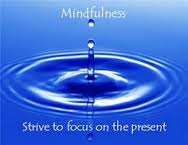Week 1
Waking up from autopilot
In a car, we can sometimes drive for miles "on automatic pilot," without really being aware of what we are doing. In the same way, we may not be really "present" moment-by-moment for much of our lives: We can often be "miles away" without knowing it.
On automatic pilot, we are more likely to have our "buttons pressed": Events around us and thoughts, feelings and sensations (of which we may be only dimly aware) can trigger old habits of thinking that are often unhelpful and may lead to worsening mood.
By becoming more aware of our thoughts, feelings and body sensations, from moment to moment, we give ourselves the possibility of greater freedom and choice; we do not have to go into the same old "mental ruts" that may have caused problems in the past.
The aim of mindfulness practice is to increase awareness so that we can respond to situations with choice rather than react automatically. Mindfulness is not about trying to get somewhere else or wanting things to be different than they are, but simply being aware of where you are and how you are. We are trying to become more familiar with habits of the mind and the body.
“Mindfulness is: paying attention, on purpose, in a particular way, in the present moment, with non-judging awareness.” ( Jon Kabat-Zinn)
The foundations of Mindfulness (ref: "Full Catastrophe Living" by Jon Kabat-Zinn) are the attitudes we are attempting to adopt as we commence our practice. By following these 7 guidelines we can be directed and supported in our endevour to engage in this "simple but not easy" practice.
- Non-judgmental: be an impartial and interested observer of everything that happens.
- Patience: this is a form of wisdom; allow things to unfold in their own time. Open yourself to learning the lesson being delivered.
- Beginners mind: come with an open mind and willingness to see everything for the first time.
-Trust: yourself, your "gut" feelings.
- Non striving: let go of goals and expectations in regard to your practice.
- Acceptance: of what is present in the moment, in the here and now.
- Letting go: of the desire to change or alter your experiences.
"Life was meant to be lived, and curiosity must be kept alive. One must never, for whatever reason, turn her back on life." (Eleanor Roosevelt)
Practice for week 1:
- To practice 15 min Body Scan or 30 min Body scan daily (or from the class recording).
- Practice mindfulness doing an everyday activity such as brushing the teeth, eating one meal, walking. Pick one of them daily and keep it simple.
- Habit releaser – see if you can notice which chairs you normally sit on at home, in a café, at the meetings. Make a deliberate choice to try another chair, or alter the position of the chair you use. This will make us aware how we often operate on autopilot
- Mindfulness attitudes by Jon Kabat Zinn
- Listen to 2 podcasts in the email
Helpful hints for the Body Scan:
- Regardless of what happens, JUST DO IT! As best you can, do not judge if you fall asleep, start your shopping list, connect with strong emotions or don't feel anything. This is your experience of the moment, simply bring awareness to it.
- The only discipline involved in this practice is regular and frequent practice so simply notice if you have notions around 'success' or 'failure'. Remind yourself of the foundations and see if you can develop curiosity and the beginners mind.
- Let go of any expectations you may have. Set the intention for the body scan up well by ring fencing time, privacy and regular practice.
“ In meditation we discover our inherent restlessness. Sometimes we get up and leave. Sometimes we sit there but our bodies wiggle and squirm and our minds go far away. This can be so uncomfortable that we feel’s it’s impossible to stay. Yet this feeling can teach us not just about ourselves but what it is to be human…we really don’t want to stay with the nakedness of our present experience. It goes against the grain to stay present. These are the times when only gentleness and a sense of humour can give us the strength to settle down…so whenever we wander off, we gently encourage ourselves to “stay” and settle down. Are we experiencing restlessness? Stay! Are fear and loathing out of control? Stay! Aching knees and throbbing back? Stay! What’s for lunch? Stay! I can’t stand this another minute! Stay!””
― Pema Chödrön, The Places That Scare You: A Guide to Fearlessness in Difficult Times
Multitasking article
2 podcasts:
Professor Willem Kuyken and 'A Life Well-Lived: Mindfulness for Life in 12 Chapters' - Chapter One "Wake Up!"
https://www.podbean.com/wlei/pb-83cct-16e0ce9
On autopilot and habituation: Modern Life Numbs You. Here’s –10% Happier with Dan Harris – Apple Podcasts

